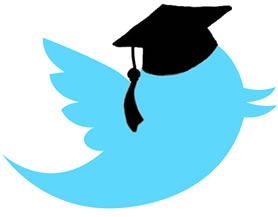Share:
What does social media mean to you? What do you use it for? What do you get out of it?
If you asked these questions to 1000 people, you very well could end up with 1000 different answers. But if you look closely, those 1000 different answers might not be so different after all. There are likely to be a couple basic themes in all of the answers. At least that’s what I’ve found to be true.
I wanted to find out what people thought about these questions.
Specifically, I wanted to know more about what the Higher Education community thought about Twitter. No, I did not ask 1000 people, but I did ask a bunch. And yes, the answers were very different. If you follow the #HigherEd community on Twitter, then you likely follow many of the folks that responded.
When I first read through it, it was overwhelming. But the more I considered it, the more I saw that the responses weren’t that different.
Sure, they said things differently, but the points they were making were generally consistent in a couple themes. Let me show you what I’m talking about. Here are a handful of quotes from the responses I got when I asked the question, “What do you like to read (or do you gravitate to) on Twitter.”
“I tend to be drawn to posts about social media and technology and higher education. I also look to Twitter for (very unofficial) benchmarking or feedback (i.e. does anyone else have residential alcohol policies on their campus they could share?).”
“I like to read about success stories from other higher education institutions.”
“My favorite aspect about Twitter is all of the variety of views, resources, and sharing that takes place… I love it when professional communities are created and engaged. Connections are maintained and learning happens every day via the ‘140’.”
“I like to have conversations with other higher education administrators and professors.”
“I’m interested in motivational support, jobs posts to share with others, and sharing ideas/collaborating with others.”
“I enjoy book suggestions and reviews, as well as blog posts from student affairs professionals and career search-related postings.”
So you read those responses and, while they’re different, they all say the same thing: Higher education professionals are utilizing Twitter as a means for professional development. Sure, there is a personal aspect to social media for most of these people. But there is no denying they see Twitter as a tool to aid them on their professional journey.
This all tied together for me when I got a response from Joe Sabado (Associate Director for Information Systems and Software Development in Student Information Systems and Technology (SIST) at UC Santa Barbara), when he directed me to a blog post he did on this topic. In the post, he referenced an article by Eric Stoller (higher education consultant and blogger for Inside Higher Ed). Here is a piece from that post:
This morning, I came across this article by Eric Stoller about alternative professional development on InsideHigherEd.com that talks about professional development opportunities in light of budget constraints. I am very familiar with the challenges of not being able to attend trainings and conferences. The last time I attended a week-long professional development conference was an Educause Institute Management Institute a few years ago (maybe 2007) . Because I have not been able to attend conferences/trainings, social media (including twitter), has been my primary tool for professional development.
This may be a “well, duh” moment for some of you, but I’ve never honestly thought about it in that light.
When you think of professional development, you usually think about going to conferences or on site visits. But a majority of the things you do during “traditional professional development,” can be replicated inside of the Twitter world. You have to know where to look, and who to follow, but it’s all right at your fingertips. And this doesn’t just apply to the Higher Ed world. There are communities of folks for literally EVERYTHING.
Thank you to everyone who responded to my survey. And a special thanks to Joe Sabado (@JoeSabado) and Eric Stoller (@EricStoller) for sharing some additional thoughts on the topic.


